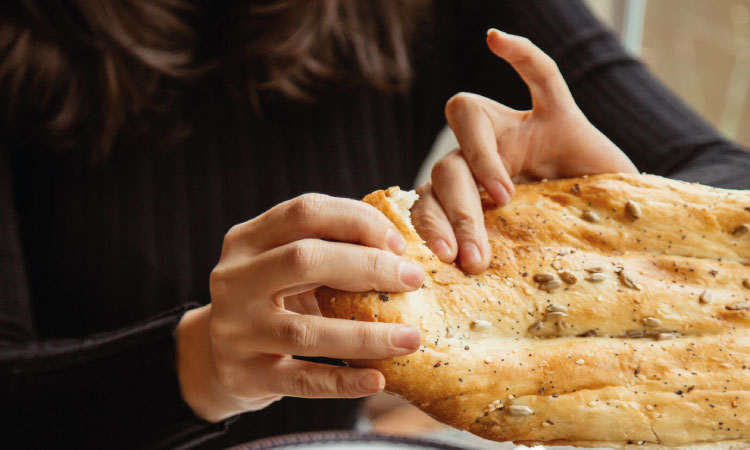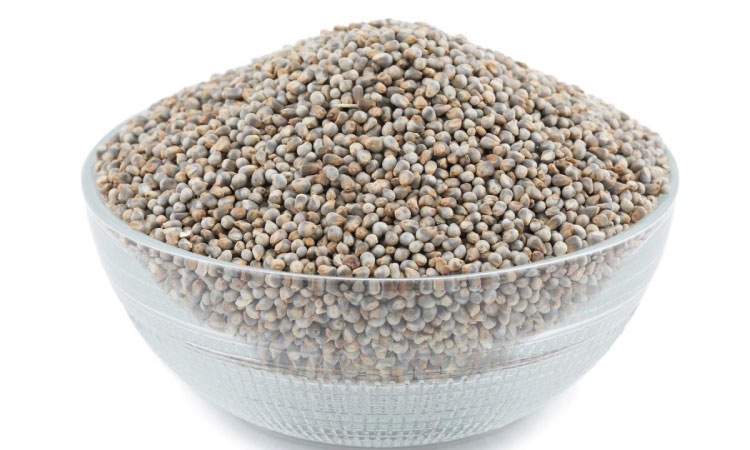When a woman becomes pregnant, she needs to put extra effort and care as her body goes through major changes. Food is one important aspect that could help in this regard. That is why experts recommend eating a rich and nutritious diet that includes food such as bajra during pregnancy. Rich in iron, protein, antioxidants, dietary fiber, calcium, magnesium, potassium, and folate, millet is one major food that is recommended by specialists to pregnant women for delivering a healthy baby.
A fetus needs different nutrients to develop into a healthy baby. And all these requirements are fulfilled by the mother through a healthy diet and vitamin/mineral supplements. Any unhealthy eating in the interim could harm the growing fetus.
In this article, we shall see what bajra is, its health benefits, and more about eating bajra roti during pregnancy.
What Is Bajra?
A widely grown dietary staple in India is bajra, usually referred to as pearl millet. Other names for it include
- bulrush millet
- dukn
- cumbu
- Gero
- sanio
- kambu, and
- babala
One of the greatest and healthiest ways to fill one’s plate when pregnant is with this food. Bajra, the name for the edible pearl millet seeds, comes in a variety of colors, including white, yellow, grey, brown, and bluish-purple. During pregnancy, bajra flour is used to make nutritious snacks and meals out of the bajra seeds, which are typically cooked like cereal grain. These grains are suitable for eating by people of all ages and have a variety of nutritional benefits.
Related Reading: 21 Pregnancy Superfoods To Include In Your Pregnancy Diet
Nutritional Profile For Bajra

Bajra is highly nutrient-dense and is an easily absorbed cereal grain. It is a member of the millet family and is rich in the following minerals.
- iron
- phosphorus
- magnesium
- zinc
- carbohydrates
It is also a vital source of amino acids, antioxidants, and several vitamins like
Calculate Due Date With LMP
- thiamine
- riboflavin
- folic acid
- niacin, and
- beta carotene
Pregnancy-related gestational diabetes is a common occurrence. Because bajra includes carbohydrates, consuming bajra roti during pregnancy results in a more gradual digestion and helps to sustain a stable blood sugar level over time.
Bajra is a good source of dietary fiber and has good cholesterol-lowering qualities. Consuming bajra during pregnancy helps ensure that you avoid constipation because it includes insoluble fiber. When coupled with seeds, bajra, which is a high-protein diet, becomes a complete meal.
Listed below is the nutritional value of consuming bajra during pregnancy1.
Calories (k.cal) 348
Protein (g) 10.9
Carbohydrates(g) 61.78
Fats (g) 5.40
Fibre (g) 11.49
Is Bajra Hot Or Cold For The Body?
Bajra millet has a warming quality since it contains a lot of starch that may be transformed into energy. Body temperature rises as a result of increased blood circulation. A few of the foods that may be prepared using bajra are
- Rotis
- Dal, and,
- Khichdi
Many more flours are beneficial to take as well to maintain one’s stomach and immunity. A few advice against eating Bajra roti during pregnancy in the summer months since it raises body temperature. Winter is regarded as a season when bajra roti consumption is at its highest. Yet, it is also used in extremely hot summers to soothe the body and guard against heatstroke.
Related Reading: Singhara During Pregnancy
Can Pregnant Women Eat Bajra?

Since the healthiness of the baby depends on the mother, moms-to-be need to eat and drink right to get proper nutrition. One such food is eating bajra during pregnancy as it is a good source of vitamins and minerals, including iron, zinc, and vitamin B6. It is safe for pregnant women to consume bajra as part of a balanced diet, in moderate quantities. Since bajra is a rich source of protein and fiber, it helps to meet nutritional value.
Bajra also regulates blood sugar levels and keeps one feeling full. Bajra is also a good source of iron which is important to prevent anemia during pregnancy. It is power-packed with carbohydrates, essential amino acids, antioxidants, and a variety of vitamins and minerals. Having bajra roti in early pregnancy is a healthy choice of food for Pregnant women and Lactating mothers due to its high iron and folic acid content.
Listed below are a few benefits of consuming bajra during pregnancy.
1. Bajra during pregnancy helps lower blood pressure
The potassium content in bajra would assist in managing one’s blood pressure when consumed every day. Those with hypertension can benefit from including bajra in their regular diet. Bajra is also high in magnesium. A person’s cardiovascular system helps reduce blood pressure. During pregnancy, bajra consumption helps to strengthen this cardiovascular system.
Related Reading: Top 9 Natural Remedies For High Blood Pressure In Pregnancy
2. Bajra is good for digestion
Millets are a good source of fiber and bajra is among them. Foods that are rich in fiber are very good for one’s digestive system and one’s gut health. Consuming bajra during pregnancy helps you have regular and better bowel movements as it bulks up the stool and stimulates peristaltic. This in turn moves it to the colon. Apart from that, bajra helps in preventing digestive issues like gas, stomach pain, cramping, ulcers, acidity, and inflammation.
3. Rich in antioxidants
Bajra is filled with antioxidants which help in getting rid of free radicals from one’s body. It also helps to detoxify one’s body and remove toxins from one’s body that are present in one’s liver and kidney. Also, consuming bajra prevents early aging, Alzheimer’s disease, and Parkinson’s.
4. Good for diabetic people
Diabetic people can benefit much from consuming millet. According to a source, foods that are high in fiber, have also been associated with improved outcomes in the management of type 2 diabetes and other chronic diseases. Bajra is a good source of fiber and has a lower glycemic index2.
5. Complete protein for vegetarians
Jowar, Bajra four during pregnancy when combined with legumes such as rajma, moong dal, urad dal, toor dal, and chana dal make up for the 9 essential acids that the human body requires.
6. Relieves constipation
Bajra has the goodness of insoluble fiber that helps to ease digestion and prevent pregnancy issues such as constipation. The property of Insoluble fiber is that it does not dissolve in water instantly. This fiber is unprocessed and thus helps other foods to move through your system. Insoluble fiber also helps to keep your gut healthy and strong.
7. Helps to prevent anemia
Bajra flour contains a good source of iron which helps in preventing anemia. You can combine it with other rich foods such as jowar or sprouts to increase the iron content of the food.
Related Reading: Is It Safe To Have Plantain (Kaccha Kela) During Pregnancy
Risks And Precautions Of Eating Bajra During Pregnancy
As a good source of carbohydrates, protein, and fiber, bajra is a highly nutritious food. It is also a powerhouse of various vitamins and minerals. This is a versatile food and consuming moderate amounts of bajra is considered safe for most people.
However, like any other food, this good has its side effects when consumed in excess or incorrectly.
Listed below are the side effects of consuming bajra during pregnancy.
1. Excessive consumption can cause digestive issues
Due to its high fiber content, eating a lot of bajra may result in stomach discomforts such as gas, bloating, and irregular bowel movements. Even modest doses of bajra may cause the lining of your stomach and intestinal tract to become inflamed in case you suffer from irritable bowel syndrome or inflammatory bowel disease. Avoid bajra if you suffer from any such digestive disease.
2. Can cause kidney stones
If Bajra is not cooked properly, its oxalates might cause kidney stones. Bajra includes phytic acid, which may prevent food from being properly absorbed in the intestines. So, consult your doctor or a nutritionist before consuming bajra during pregnancy if you have any of these medical conditions.
Related Reading: Is It Safe To Eat Raw Vegetables During Pregnancy?
3. Bajra can cause malabsorption syndrome
Bajra contains anti-nutrients. The phytonutrients or phytochemicals and a particular class of nutrients in bajra contain phytic acid that could impair the body’s ability to absorb essential nutrients. However, this usually isn’t a cause for concern if you have a balanced diet. However, bajra when excessively combined with legumes, lentils, and other grains, then it may cause malabsorption syndrome and nutritional deficiencies in one’s body3.
Conclusion

Bajra is a healthy millet that is consumed worldwide due to its nutritional value. It is packed with healthy nutrients that may contribute to overall health. Since bajra contains excessive heat properties, a meal containing Bajra can be combined with a cooling spice such as fennel seeds or desi ghee to reduce its heat. These gluten-free edible seeds of the pearl millet plant will provide you with instant energy and help in digestion as well. Also, bajra has high amounts of protein and calcium which help to build bones, and muscle. Hence, consuming bajra during pregnancy in moderation is likely to keep one energized.
According to Our Nutritionist Sushree, bajra is an excellent source of iron that helps meet increased iron requirements during pregnancy and support fetal development. It also contains insoluble fiber which may help in preventing constipation during pregnancy. Additionally, bajra has a low glycemic index, making it a good choice for those with gestational diabetes. However, as millets usually contain phytic acid, which is an anti-nutrient that could reduce absorption of other nutrients, it is always advised to soak, sprout or ferment millets before adding them to your diet. This will help reduce its negative effect and provide you with good nutrients, especially during pregnancy.

